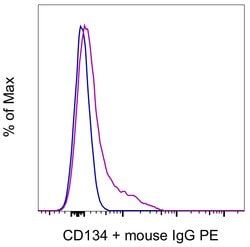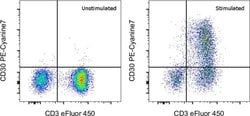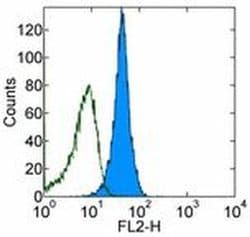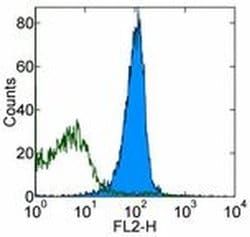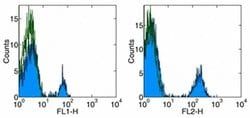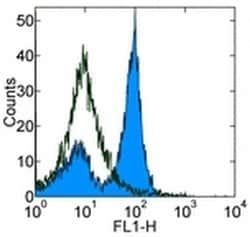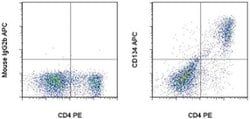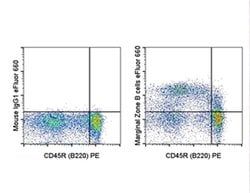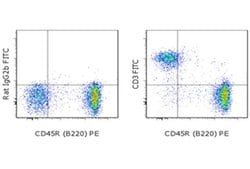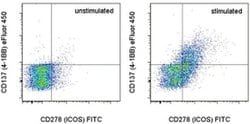CD134 (OX40) Monoclonal Antibody (OX40), APC, eBioscience™, Invitrogen™
Manufacturer: Invitrogen
Select a Size
| Pack Size | SKU | Availability | Price |
|---|---|---|---|
| Each of 1 | 50-112-9301-Each-of-1 | In Stock | ₹ 28,302.00 |
50-112-9301 - Each of 1
In Stock
Quantity
1
Base Price: ₹ 28,302.00
GST (18%): ₹ 5,094.36
Total Price: ₹ 33,396.36
Antigen
CD134 (OX40)
Classification
Monoclonal
Concentration
0.2 mg/mL
Formulation
PBS with 0.09% sodium azide; pH 7.2
Gene Accession No.
P15725
Gene Symbols
Tnfrsf4
Purification Method
Affinity chromatography
Regulatory Status
RUO
Gene ID (Entrez)
25572
Content And Storage
4° C, store in dark, DO NOT FREEZE!
Form
Liquid
Applications
Flow Cytometry
Clone
OX40
Conjugate
APC
Gene
Tnfrsf4
Gene Alias
ACT35; ACT35 antigen; ATC35 antigen; CD134; CD134 antigen; IMD16; Ly-70; lymphoid activation antigene ACT35; MRC OX40; Ox40; OX40 antigen; OX40 cell surface antigen; OX40 homologue; OX40L receptor; TAX transcriptionally-activated glycoprotein 1 receptor; tax-transcriptionally activated glycoprotein 1; tax-transcriptionally activated glycoprotein 1 receptor; TNF receptor superfamily member 4; Tnfrsf4; tumor necrosis factor (ligand) superfamily member 4; tumor necrosis factor receptor superfamily member 4; tumor necrosis factor receptor superfamily, member 4; tumor necrosis factor superfamily, member 4; Txgp1; Txgp1l
Host Species
Mouse
Quantity
100 μg
Primary or Secondary
Primary
Target Species
Rat
Product Type
Antibody
Isotype
IgG2b κ
Description
- Description: The monoclonal antibody OX40 reacts with rat CD134, a 50-kDa glycoprotein belonging to the TNFR superfamily
- CD134, which is also known as OX40, is expressed on activated T cells, TH1, TH2, TH17, and Tregs, but not on naive CD4 or CD8 T cells or most memory cells
- CD134 is also inducible on NKT cells, neutrophils, and NK cells
- CD134 binds to CD252 (OX40L) to mediate T cell expansion and survival, as well as memory T cell generation
- Finally, CD134 is involved in Treg suppression and tolerance
- Applications Reported: This OX40 antibody has been reported for use in flow cytometric analysis
- Applications Tested: This OX40 antibody has been tested by flow cytometric analysis of stimulated rat splenocytes
- This can be used at less than or equal to 0.125 μg per test
- A test is defined as the amount (μg) of antibody that will stain a cell sample in a final volume of 100 μL
- Cell number should be determined empirically but can range from 10^5 to 10^8 cells/test
- It is recommended that the antibody be carefully titrated for optimal performance in the assay of interest
- Excitation: 633-647 nm; Emission: 660 nm; Laser: Red Laser
- Filtration: 0.2 μm post-manufacturing filtered
- OX40 is a protein receptor found on the surface of T cells, a type of white blood cell that plays a crucial role in the immune system
- When activated, OX40 promotes the proliferation and survival of T cells, leading to a stronger immune response against cancer cells and infectious agents
- OX40 agonists, which are drugs that activate OX40, have shown promising results in preclinical and clinical studies as a potential immunotherapy for cancer
- They can enhance the efficacy of other cancer treatments such as chemotherapy and checkpoint inhibitors, and may also have applications in autoimmune diseases and allergies.
